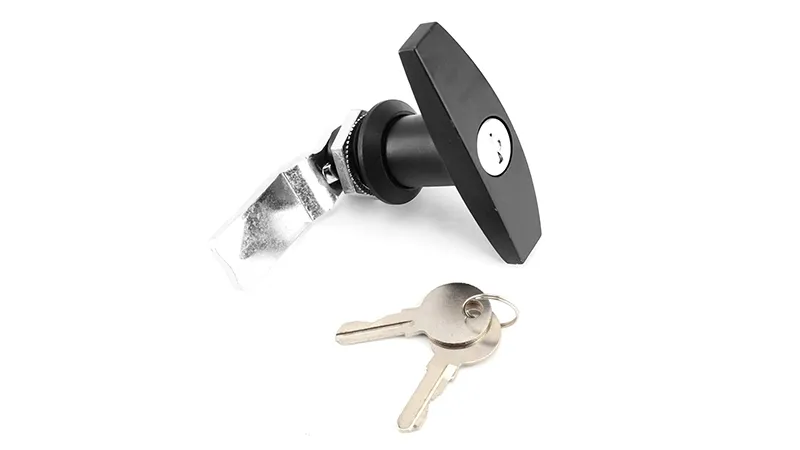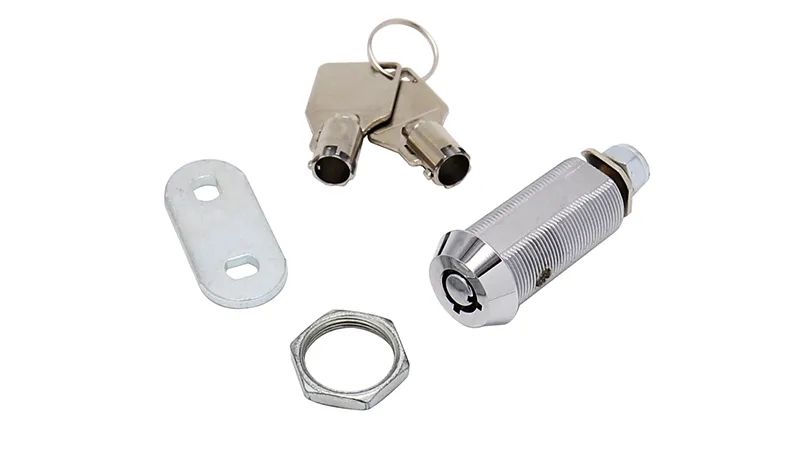In the vending machine industry, ensuring security and reliability is essential. Whether used in schools, offices, hospitals, or public spaces, vending machines contain valuable goods and cash, making them vulnerable to theft and tampering. One of the key components that protect these machines is the T-handle vending machine lock—a robust, easy-to-operate, and high-security locking mechanism designed specifically for vending equipment.
T-handle locks have become the standard security feature for most vending machines worldwide. Their combination of strength, durability, and simplicity ensures that machine operators can maintain safety while still providing convenient access for authorized personnel.
A T-handle vending machine lock is a specialized locking device used to secure the access door of vending machines. The name comes from the “T” shape of the handle, which allows users to apply greater torque when locking or unlocking.
This lock typically consists of three key components:
The cylindrical body, which houses the locking mechanism and provides the primary structure.
The locking core, often a tubular or electronic design, that determines the level of security and operates using a specific key or digital signal.
The T-shaped handle, which provides grip and leverage, making it easier to open or close the vending machine securely.
When the correct key is inserted into the lock core and turned, it disengages the locking bolt, allowing the T-handle to rotate. This rotation then releases the door of the vending machine. Once closed and locked, the handle rests flush against the machine’s surface, preventing unauthorized access and maintaining a sleek, tamper-resistant design.

Vending machines are often placed in public or semi-public areas, making them susceptible to tampering and vandalism. T-handle locks are crucial for the following reasons:
Made from hardened materials like zinc alloy or stainless steel, T-handle locks can resist prying, drilling, or hammering attempts.
The ergonomic T-shape allows quick access for authorized personnel, even when wearing gloves or operating in tight spaces.
These locks are designed for years of outdoor and indoor use, enduring environmental challenges such as humidity, dust, and temperature variations.
T-handle locks are compatible with multiple types of vending machines, including snack, beverage, ticket, and kiosk machines.
Depending on the core type—mechanical or electronic—operators can choose between different security levels to suit their needs.
There are several types of locks used in vending machines today. Each type offers a unique combination of security, cost, and functionality. The most popular categories include tubular locks, T-handle locks, and passive electronic locks.
Tubular locks, also known as barrel locks, are among the most common types found in vending machines. They feature a circular keyway and a cylindrical design, which makes them highly resistant to traditional lock-picking methods.
Key features of tubular locks include:
High Security: The round shape and multiple pin configurations make it challenging for intruders to manipulate.
Durable Materials: Typically made from hardened steel or brass to withstand physical attacks.
Easy Replacement: Modular design allows for quick maintenance or lock changes.
Due to their proven reliability, tubular locks remain a preferred choice in vending, gaming, and automated retail machines. They are often paired with T-handles for additional security.

T-handle locks combine mechanical strength and ease of operation. The T-shaped design provides better leverage when opening or closing the machine, minimizing effort and maximizing security.
These locks are widely used because:
They allow fast access with the proper key.
The handle provides better grip and control.
They are simple yet robust, ideal for both indoor and outdoor vending units.
Operators can choose from various core types to insert into the T-handle assembly, such as tubular cores, flat key cores, or electronic cores. This modular approach enables flexible upgrades without replacing the entire lock body.
With technological advancements, passive electronic locks have become increasingly popular in modern vending systems. Instead of traditional mechanical keys, these locks use electronic authentication—often through Bluetooth, RFID, or smart keys.
Advantages of passive electronic locks include:
Keyless Operation: Eliminates the risk of lost or duplicated keys.
Access Records: Provides a digital audit trail of who accessed the machine and when.
Remote Management: Allows operators to monitor, authorize, or revoke access remotely.
Enhanced Security: Difficult to bypass without proper electronic authorization.
Passive electronic locks are ideal for large-scale vending operators or enterprises managing multiple machines across locations. They simplify key management and enhance accountability.
The operation of a T-handle lock is simple yet secure. When the correct key—mechanical or electronic—is inserted into the lock core, it aligns the internal pins or engages the circuit to release the locking bolt. The user then turns the T-handle, which retracts the locking cam or latch, allowing the vending door to open.
When closing, rotating the handle in the opposite direction locks the mechanism firmly. Once secured, the T-handle typically rests in a horizontal position flush with the surface, making it resistant to prying.
Some advanced models incorporate spring-loaded mechanisms or weatherproof seals to improve reliability and longevity, particularly for outdoor applications.
To endure harsh environments and frequent use, T-handle vending locks are manufactured from high-strength materials such as:
Zinc Alloy: Offers corrosion resistance and excellent casting precision.
Stainless Steel: Provides superior strength and protection against rust.
Chrome-Plated Steel: Combines aesthetics with durability.
Common surface finishes include brushed, polished, or nickel-plated coatings, which enhance appearance while protecting against wear and corrosion.
Modern vending locks come equipped with several security features designed to resist tampering and unauthorized access:
Anti-Drill Plates: Hardened inserts that prevent drilling through the lock face.
Key Code Control: Unique key codes reduce the risk of key duplication.
Pick-Resistant Mechanisms: Complex pin configurations or electronic encryption prevent manipulation.
Weather Seals: Rubber or silicone gaskets protect against dust, water, and temperature variations.
Reinforced Handle Structure: Prevents bending or breaking under pressure.
These features make T-handle locks one of the most secure solutions for vending equipment, surpassing standard cabinet or drawer locks.
While primarily designed for vending machines, T-handle locks are used across various industries requiring high-security enclosure systems, including:
Vending Machines (snack, drink, coffee, ticket)
Parking Payment Terminals
ATM and Cash Handling Machines
Telecommunication Cabinets
Power Distribution Boxes
Parcel Lockers and Kiosks
Gaming and Amusement Machines
Their versatility, reliability, and security make them suitable for any application that demands restricted yet convenient access.
When selecting a T-handle lock for your vending machine or kiosk, several factors should be considered:
Lock Core Type: Choose between tubular, flat, or electronic cores based on security level and key management needs.
Material: Opt for stainless steel or chrome-plated finishes for outdoor environments.
Compatibility: Ensure the lock fits your specific vending machine brand or model.
Key Control System: For large operations, using a master-key or digital key system can simplify access management.
Weather Resistance: For outdoor or high-humidity installations, weather-sealed locks offer better protection.
A well-chosen T-handle lock not only safeguards the machine’s contents but also reduces maintenance costs and operational downtime.
Ensuring the long-term reliability of T-handle vending machine locks requires regular maintenance and careful attention. Mechanical locks benefit from routine cleaning and lubrication using non-corrosive oils or sprays. This helps prevent debris, dust, or grime from accumulating in the keyhole or locking mechanism, which could cause jamming or wear over time. Frequent inspections of the handle and core can detect early signs of corrosion or mechanical stress, allowing preventive measures before significant damage occurs.
For modern electronic T-handle locks, maintenance includes checking battery levels and ensuring firmware or software updates are applied as needed. This keeps the lock functioning smoothly and ensures all security features operate effectively. Some electronic locks also benefit from periodic calibration to maintain accuracy and response reliability.
One of the advantages of T-handle locks is their modular design. If a key is lost, stolen, or compromised, replacing just the lock core is often sufficient, without the need to replace the entire handle assembly. This modularity not only saves costs but also minimizes downtime, allowing vending operators to maintain security efficiently. With proper care, T-handle locks can provide durable, dependable protection for many years, even in high-use or outdoor environments.
As vending technology evolves, so do the locking systems that secure them. The trend is moving toward smart, connected locks that integrate with IoT platforms. These future-ready locks will allow operators to:
Monitor access activity in real time
Receive alerts for unauthorized attempts
Grant temporary digital access to service personnel
Integrate with cashless payment and inventory systems
Such innovations will make T-handle locks not just mechanical devices but key components of intelligent vending ecosystems.
The T-handle vending machine lock is more than a simple piece of hardware—it’s a critical part of any vending system’s security infrastructure. Its combination of strength, usability, and adaptability ensures that vending operators can trust their machines to remain safe and accessible only to authorized users.
Whether you choose a tubular, mechanical T-handle, or electronic lock, investing in high-quality components provides peace of mind and long-term reliability. As technology advances, these locks continue to evolve, balancing security with the convenience needed in today’s automated world.
In an age where vending machines are becoming smarter and more connected, the humble T-handle lock remains a cornerstone of protection—keeping products, profits, and customer trust secure.
